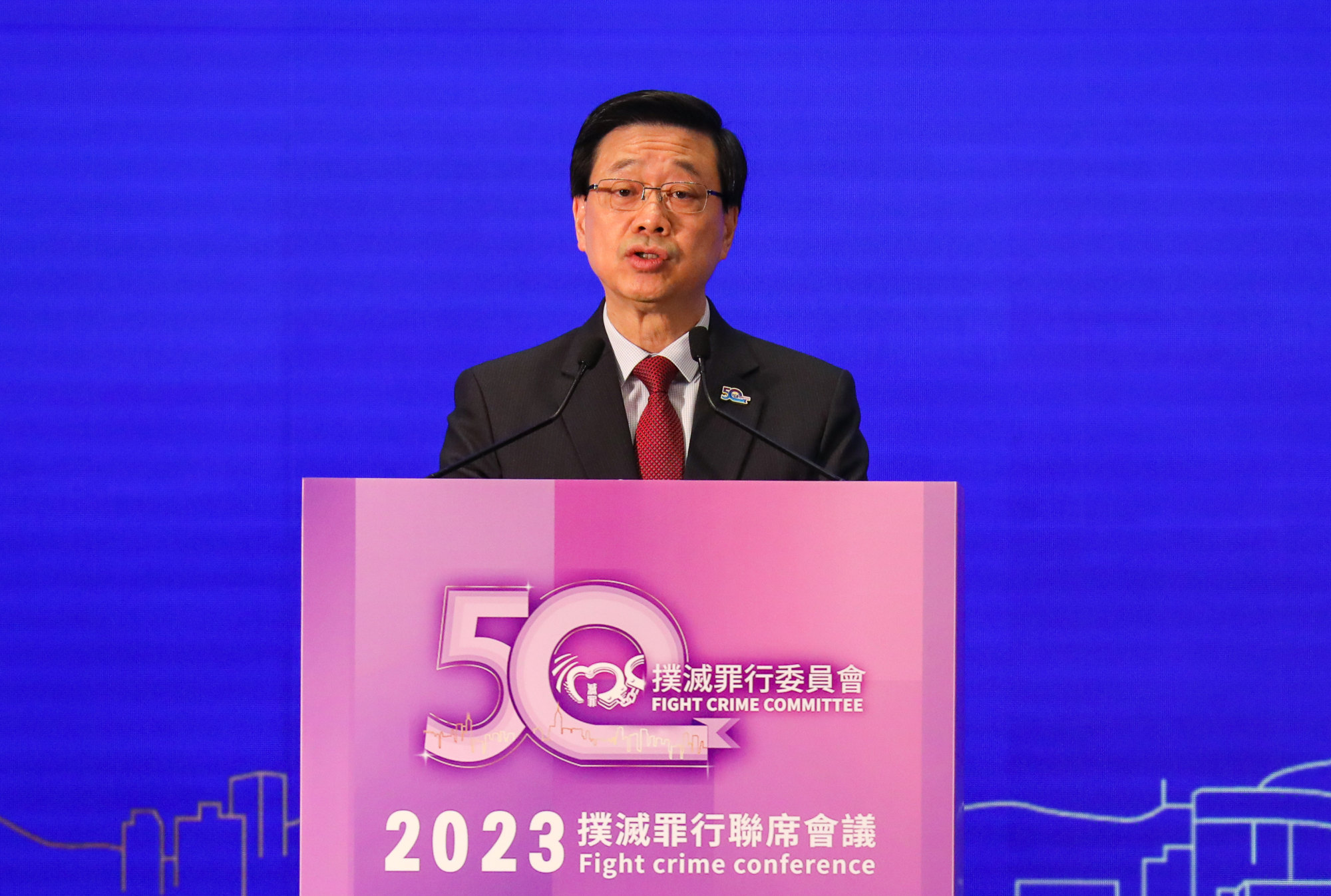
Hongkongers must stay vigilant against people with ‘ulterior motives’ and foreign forces trying to ‘sow discord’, city leader John Lee says
- Chief Executive John Lee tells Fight Crime Conference that violence seen during the months-long protests in 2019 could return at any time
- City is back at ‘centre of the international stage’ but must enact its own security law to complement the one implemented by Beijing in 2020, he says
Hongkongers must remain vigilant to guard against people with “ulterior motives” and foreign forces trying to “sow discord” or bring back social unrest, the city’s leader has warned, underscoring that stability is needed to attract investment.
Chief Executive John Lee Ka-chiu on Saturday told the 2023 Fight Crime Conference that violence seen during the months-long protests in 2019 could return at any time and the city must enact its own national security law by next year.
“I have a profound feeling, when interacting with guests from all over the world at different events, that Hong Kong must have a stable environment if it is to attract global investors,” Lee said as the conference returned after a five-year suspension following the protests and Covid-19.

“We should therefore stay vigilant at all times,” he said, warning against the presence of “soft resistance”, which was still recurring.
“Everyone who loves Hong Kong should take national security as the starting point in staying alert and guarding against those with ulterior motives or foreign forces who try to sow discord in the city,” he said. “We should object and refute any smear campaigns with ill intention [against Hong Kong].”
Lee said the national security law imposed by Beijing in the wake of the protests had achieved immediate results in ending the chaos, declaring Hong Kong was back to the “centre of the international stage” with its rebound in tourist numbers and return of mega events.
He also stressed the city needed to complete its own national security legislation, as stipulated in Article 23 of the Basic Law, the city’s mini-constitution, by next year to complement the Beijing-decreed one. The goal was spelled out in Lee’s policy address last month.
Secretary for Justice Paul Lam Ting-kwok said at a sharing session with leaders and members of various district fight-crime committees that it was necessary to change the attitude of some residents towards the Beijing-imposed law, which was smeared every time it was mentioned.
He likened the security legislation to a vaccine which protected residents against disease.
“Behaviour that endangers national security is like the viruses and bacteria that we see everywhere, [and] the goal of the national security law is like a vaccine injection,” he said. “Our intent is not to hurt you, we just do not want you to fall sick or die.”
Lam emphasised that the national security law was “defensive” and not “offensive”.
“We are not targeting residents, we are targeting the external elements who are hurting the healthy survival of our society,” he said.
Director of Public Prosecutions Maggie Yang Mei-kei said at the discussion that the people who endangered national security were very good at using different mediums and methods to promote their opinions, false information and Hong Kong independence.
“They will often use young people who do not have much life experience as targets for incitement,” she said.
“The Hong Kong government and different members of society need to increase the awareness of national security and law abidance among the public, especially young people, to prevent thoughts of endangering national security from sprouting in their hearts.”
The high-level conference, attended by nearly 500 people at government headquarters, was organised by the Fight Crime Committee to provide a platform for members, and those from the 18 district panels, to exchange views on law and order. The conference also marked the committee’s establishment 50 years ago.
The city’s No 2 official and committee chairman, Eric Chan Kwok-ki, security minister Chris Tang Ping-keung and police chief Raymond Siu Chak-yee also attended.
Tang and Siu acted as moderators at separate discussions, with the security minister’s session looking at drug problems. The police chief’s session discussed deception and online scams.
Tang said authorities would continue to push forward their anti-drug efforts in the areas of legislation, enforcement, outside cooperation and research.
With regard to their effort in preventing scams and fighting crime, he added authorities will tackle crime through a variety of means, particularly those concerning online cons. They will also make use of technology to prevent fraud and have targeted promotions for different communities.


